Some people only want you to listen to their stories
On Tuesday we took the Nissan Patrol into some pretty rural areas. The roads were atrocious, and for 2-3 hours this morning the car was jumping all over the place as it dealt with some washboard road surfaces that had my eyes buzzing. We probably only travelled 40 miles…We attended a self-help group which met underneath a mango tree. We’ve been to a few of these before, but they are very useful as they are an opportunity for us to hear first hand the issues the mentally ill and their carers face.

It is very common in Ghana for groups to come together to help themselves. What Basic Needs does is to facilitate groups of mentally ill people to gather for the first time to swap their own stories and experiences. As an example, at the group on Tuesday this man talked about how he had benefited from micro finance to buy the tools to become a cobbler – he has now paid his loan back and his new trade is helping his integration into the community.

It is also clear what a burden a mentally ill child is on the parents, and this is exacerbated when the family lives below the poverty line, with many families earning less than $100 a year. Here is Robbie with one of these children – we did not understand what was wrong with her.
After the meeting we went to meet two mentally ill people. The first was a 25 year old woman called Alicia who was epileptic. She had a big scar across her throat where she had fallen into a fire during an epileptic fit, and another wound on her arm where she had scraped it on the ground during another fit. Here she is with her family – father on the right, mother and siblings on the left.
She was pretty withdrawn during our conversation as she was recovering from a fit a couple of weeks ago which still affects her. Drugs help increase the length of time between convulsions but they do not stop them. What amazed me was how grateful her father was for the visit. There is a stigma against epileptics, and people will steer clear of someone having a fit for fear that touching them will give them bad luck (despite the fact that epilepsy is not contagious). To have three ‘white men’ come and just listen to her story was a sign to her community that she had something to say, and her father was so happy that we paid the visit.
We next visited an old man called Mohammed who was a psychotic. He used to hear voices and go missing as he wandered the streets. He couldn’t see very well but he too was so grateful that we visited him and just listened to him. He now takes drugs which have stopped the voices in his head.
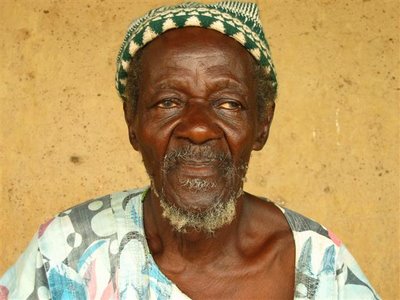
Both of these visits made me realise that some people don’t expect anything from you. We can't give them anything (we usually leave $5 or so, which always takes people by surprise), but it is often the first time anyone from outside their community has taken an interest in their illness. Just the fact that we come to listen is so important - I have never come across anything like it. Normally I would expect people to be asking "so what are you here for?" and "what are you going to do for me?" but you don't get any of that.
We set aside Wednesday as a training day for the Basic Needs team. As three partners with different areas of expertise and experience, we wanted to share some of our experiences with the Basic Needs people. We will run some more training sessions next week for some of the NGO partners that Basic Needs work with.
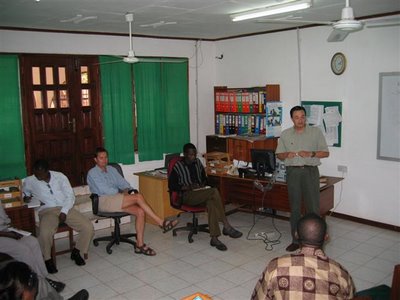
Jose-Luis ran a session on microfinance, Robbie talked about business planning, budgeting and project management, and I talked about… cultural diversity!
Before you start wondering how on earth I could be qualified to talk about this, when we were in Canada a few weeks ago we heard an excellent lecture from a chap from Amsterdam on the subject. In the afternoon Jose-Luis, Robbie, and I ran one-on-one coaching sessions with the Basic Needs team to help them deal with a particular issue that was facing them.
On Thursday we travelled further north to a city called Bolgotanga. This is the capital of the Upper East Region which has a population of about 100,000. This region borders Burkina Faso to the North and Togo to the East, and is the poorest in Ghana.
We met a number of the doctors and psychiatric nurses in the city to discuss the issues facing them – it appears transport is the biggest difficulty. The community psychiatric nurses often have to travel to very rural villages, but because they do not have their own motorbikes (the best way of crossing the difficult terrain) they have to hitchhike or ride on the back of commercial vehicles passing through the area. Unbelievable.
On Friday we travelled to two very small villages which were hosting more self-help groups. When I introduce myself, I stand up and say “Good morning, my name is Zubin and I have come from England”. I found out that this is translated into the equivalent of “his name is Zubin and he comes from the Land of the White Chiefs”!!! – referring to Great Britain as Ghana’s colonial rulers before independence!
Two individuals made an impression on me at these groups. The first was a man who was mentally ill but had originally visited a ‘Traditional Healer’. Some 95% of Ghanaians turn first to traditional medicine rather than ‘conventional’ doctors and nurses, and whilst many of the herbal remedies are no doubt effective, the treatment of the mentally ill is often very inhumane.
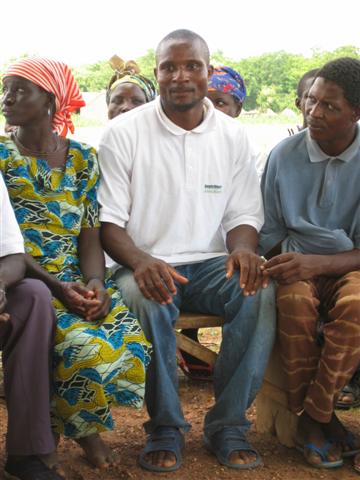
This man had his hands and legs chained together by a traditional healer, and was then beaten in order to rid him of the evil spirits which were making him ill. This type of treatment is not uncommon – I have heard a number of instances where the ill have been shackled and caned by traditional healers. It is very sad.
This woman had a child who was ill, and she really contributed to the group talking about the difficulties in raising a young son who needed so much care.
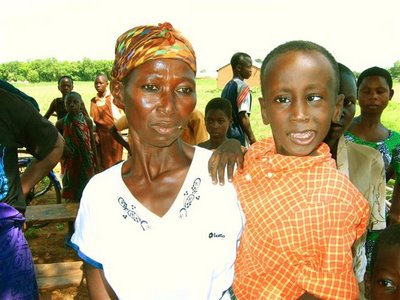
I think mentioned in my last update how much the children here in the rural areas are fascinated by us and love it when we take their picture and show them the screen on the camera. Here are a few pictures taken this week…
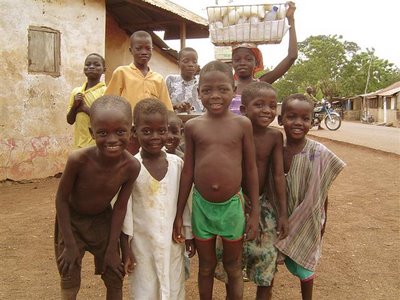
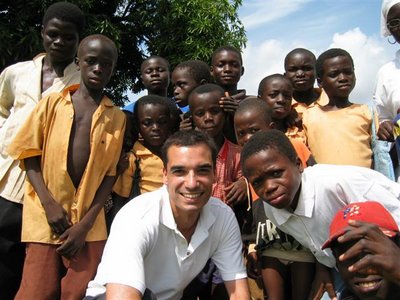
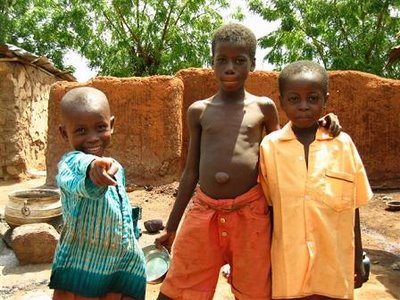
We had an amazing experience after one of the self-help groups on Friday. The group was gathered in the corner of a primary school playground, and when the kids came out to play they went straight over to us. We had a sea of little Ghanaian children around us, and when Robbie started to play ‘Simon Says’ with them they went absolutely crazy, pushing and shoving round us, jumping up and down and trying to hold our hands. I have never experienced anything like it! They then started chanting “So you are welcome! So you are welcome! So you are welcome!”. It was unreal.

I love the kid on the upper left of the picture who is clearly getting squashed by his friends in all the excitement!
When I talked about culture at the training session on Wednesday, I talked about one of the outer layers of culture being some of the first things an outsider to a country notices. There are so many things about Ghana that make me smile, but two in particular are the driving and the names of the shops.
On the way home from work the other day, Robbie and Jose-Luis spotted this guy. He wanted to take his sofa home from the shop, but instead of calling for a delivery lorry, he decided it was cheaper to use his friend who had a motorbike…! I don’t know if the picture will come out clearly enough, but there is a pillion rider balancing the sofa on his head!
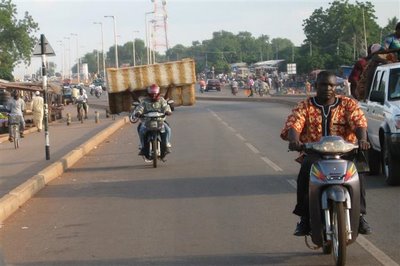
One of the other things that makes me laugh are the names of the shops. So many comprise a religious reference plus the type of shop they are, so in the last week here is a selection of some of the names I have seen…
Thy Will Be Done Fashion Centre
Be A Man Clutch and Brakes
Stake Your Wealth Lottery
Great Provider Hair Salon
Except God Communication Centre
God Is My Defence Enterprises
Sanctuary of Glory Hair Salon
Think O God Enterprise
Amazing Grace Ventures
...any suggestions for what should precede “PricewaterhouseCoopers”?
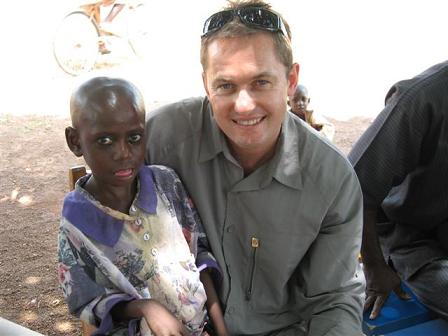
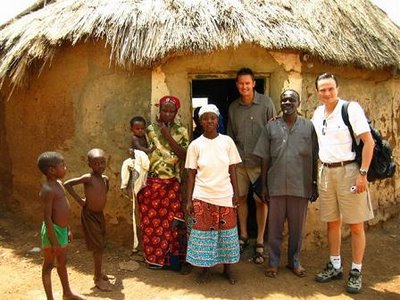

0 Comments:
Post a Comment
<< Home